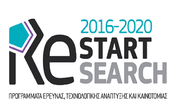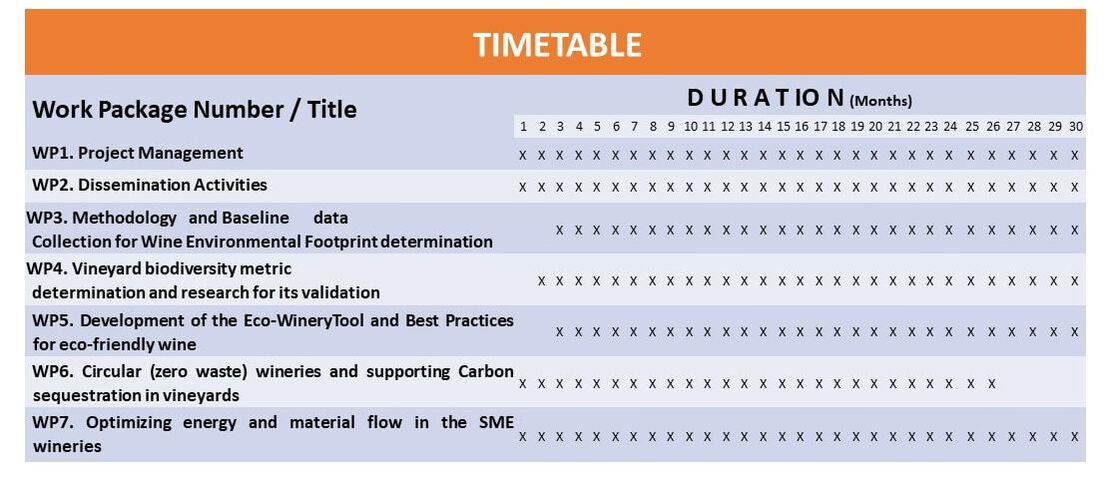Eco-innovation for the production of low environmental footprint wine
EXCELLENCE/1216/0279
Start date: 09/04/2019
End date: 02/10/2021
Total budget: 249.923,04 EUR
CUT budget: 216.446,20 EUR
EXCELLENCE/1216/0279
Start date: 09/04/2019
End date: 02/10/2021
Total budget: 249.923,04 EUR
CUT budget: 216.446,20 EUR
Project summary:
Wine tradition in Cyprus outdates most other wine-producing nations, with a history of more than 5 millennia. Vineyards shape the rural landscape of the island as indigenous vine varieties are one of a few crops able to grow under the dry and warm climate of the island. While in the recent past, vineyards covered close to 30.000 ha, nowadays the area has dropped to less than 7.000 ha, reflecting the intense socioeconomic challenges threatening the sector. Wine imports have progressively captured two thirds of the share of the local market, valued at €75 million annually, outcompeting local SMEs that seem unable to create a unique identity for their product. EcoWinery aims at promoting eco-innovation in Cypriot vineyards and SME wineries and inspiring technological breakthroughs to address the important economic and social challenges of the sector in line with the Europe 2020 strategic framework for smart growth and sustainable development. Through a well targeted approach, Eco-Winery will provide validated tools to enable SME wineries determine and lower the environmental footprint of wine and develop an effective branding strategy build around three inherent characteristics of their product: a) high quality, b) low environmental impact and c) contribution to conservation of indigenous and native animals.
Wine tradition in Cyprus outdates most other wine-producing nations, with a history of more than 5 millennia. Vineyards shape the rural landscape of the island as indigenous vine varieties are one of a few crops able to grow under the dry and warm climate of the island. While in the recent past, vineyards covered close to 30.000 ha, nowadays the area has dropped to less than 7.000 ha, reflecting the intense socioeconomic challenges threatening the sector. Wine imports have progressively captured two thirds of the share of the local market, valued at €75 million annually, outcompeting local SMEs that seem unable to create a unique identity for their product. EcoWinery aims at promoting eco-innovation in Cypriot vineyards and SME wineries and inspiring technological breakthroughs to address the important economic and social challenges of the sector in line with the Europe 2020 strategic framework for smart growth and sustainable development. Through a well targeted approach, Eco-Winery will provide validated tools to enable SME wineries determine and lower the environmental footprint of wine and develop an effective branding strategy build around three inherent characteristics of their product: a) high quality, b) low environmental impact and c) contribution to conservation of indigenous and native animals.
Coordinating beneficiary:

Address: 30 Archbishop Kyprianos Street, 3036, Limassol
Phone: +357 2500 2500
Website: www.cut.ac.cy
Phone: +357 2500 2500
Website: www.cut.ac.cy
Associated beneficiaries:

Address: 56 Yiannou Kranidioti Avenue, 2220 Latsia, Nicosia Cyprus
Phone: +357 22 411600
Website: http://www.ouc.ac.cy
Phone: +357 22 411600
Website: http://www.ouc.ac.cy

Foreign Research Organization:

Address: Zografou Campus 9, Iroon Polytechniou str, 15780 Zografou, Athens, Greece
Phone: +30 210-772-1000 Website: www.ntua.gr |

Address: University of Aberdeen
King's College, Aberdeen, AB24 3FX Phone: +44 (0)1224 272000 Website: www.abdn.ac.uk/ |
Funding agency:
The project is co-funded by the European Regional Development Fund and the Republic of Cyprus.
Implementation Actions
WP3. Wine Environmental Footprint determination

The objectives of the WP3 are to:
- Develop the methodological framework for Wine Environmental Footprint estimation under Cypriot conditions.
- Collect baseline data on management practices in Cypriot viticulture and winemaking.
An overwhelming majority (>90%) of consumers in Cyprus prefer environmentally friendly products (Eurobarometer 2012) and wines (CUT Consumer Survey 2017). WP3 addresses the need by developing a methodological framework for determination of wine PEF under Mediterranean conditions. The methodological framework for PEF determination will be implemented in the user friendly freeware tool developed in WP5.
WP4. Biodiversity metric for vineyards
WP4 aims at providing a biodiversity assessment framework for farmers and wineries to ensure the application of farm management practices which are beneficial to biodiversity conservation and provide a metric for the Biodiversity category of PEF.
The biodiversity metric will enable farmers to evaluate the effect of different farming practices on biodiversity conservation in and around vineyards and select options that conserve native flora and fauna.
The biodiversity metric will enable farmers to evaluate the effect of different farming practices on biodiversity conservation in and around vineyards and select options that conserve native flora and fauna.
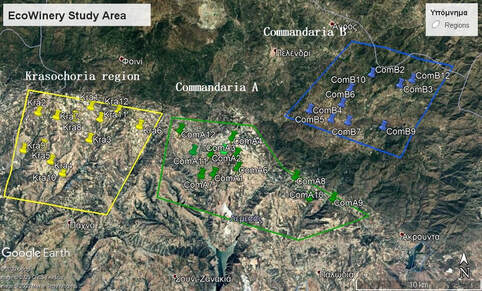
Therefore, biodiversity monitoring in vineyards conducted in 2020 and 2021 as well. Plants (herbs, shrubs, trees), insects (bees, butterflies, orthoptera), reptiles (lizards, snakes) and birds were monitored in 36 vineyards of Xynisteri variety. Vineyards were located in two wine regions of Cyprus, Krasochoria, and Commandaria.
WP5. Eco-WineryTool and Best Practices for eco-friendly wine
WP5 will translate results of the WP3 and 4 into a decision making framework for quantification of environmental footprint of wine through Eco-WineryTool, a user friendly freeware.
In addition, the project team will develop with assistance from the Stakeholder and Scientific Committees the Best Practices for eco-friendly wine Protocol, that will describe the minimum acceptable vineyard and winery practices for a wine to receive in the future the “Low Footprint Wine Quality Mark” which will be available to farmers and policy makers with a view to assist them in ensuring sustainable production and promotion through the Quality Mark.
In addition, the project team will develop with assistance from the Stakeholder and Scientific Committees the Best Practices for eco-friendly wine Protocol, that will describe the minimum acceptable vineyard and winery practices for a wine to receive in the future the “Low Footprint Wine Quality Mark” which will be available to farmers and policy makers with a view to assist them in ensuring sustainable production and promotion through the Quality Mark.
WP6. Circular (zero waste) wineries and supporting Carbon sequestration in vineyards
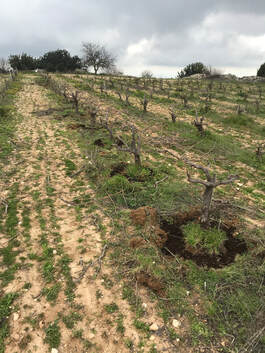
WP6 aims at developing and demonstrating techniques for reduction of the climate change and eutrophication categories of wine PEF. Preliminary work has shown that current practices (especially N fertilization and frequent soil cultivation) increase substantially the value of the two categories. The work will demonstrate an efficient way of managing Cypriot vineyards to increase carbon sequestration, reduce carbon emissions and use an organic source of N instead of synthetic by: 1) using two by-products (animal manure and winery sludge) that are harmful for the environment if improperly disposed as fertilizer, 2) implement reduced tillage to minimize soil CO2 emissions (due to rapid organic matter decomposition) and the energy required for field operations. Conventional viticulture, as applied in the majority of vineyards in Cyprus, will serve as control.
WP6 aims at developing and demonstrating techniques for reduction of the climate change and eutrophication categories of wine PEF. Preliminary work has shown that current practices (especially N fertilization and frequent soil cultivation) increase substantially the value of the two categories. The work will demonstrate an efficient way of managing Cypriot vineyards to increase carbon sequestration, reduce carbon emissions and use an organic source of N instead of synthetic by: 1) using two by-products (animal manure and winery sludge) that are harmful for the environment if improperly disposed as fertilizer, 2) implement reduced tillage to minimize soil CO2 emissions (due to rapid organic matter decomposition) and the energy required for field operations. Conventional viticulture, as applied in the majority of vineyards in Cyprus, will serve as control.
WP7. Optimizing energy and material flow in the SME wineries
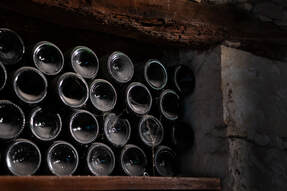
In WP7 the implementation of measures novel for the Cypriot and Mediterranean wine production will lead to the reduction of the climate change category of PEF (carbon footprint). The energy flow in the winery will be therefore analysed in detail and according to the results, techniques such as the “Thermal Energy Storage” (TES) for reducing the energy used for chilling will be considered for implementation in order to improve the energy use efficiency and reduce by 10% the electricity consumption in the winery. The 10% reduction was selected as it represents a realistic target based on preliminary data from Nicolaides Winery, with an average (last 3 years) annual electricity consumption at 52.000. Additionally, lighter glass bottles will be used as the production of glass contributes significantly to the PEF of wine, therefore reducing materials consumption.
Photo Gallery
Timetable
Useful links
PEFCR pilot on wine - http://ec.europa.eu/environment/eussd/smgp/ef_pilots.htm#pef
EU Pilot on Environmental Footprint for Wine - http://ec.europa.eu/environment/eussd/smgp/index.htm,
Italian Viva Sustainable Wine - http://www.viticolturasostenibile.org/,
CoolFarmAlliance Biodiversity Metric – coolfarmtool.org https://coolfarmtool.org/coolfarmtool/
Lodi Rules Sustainable Winegrowing in California - http://www.lodigrowers.com/lodirules/certification/
Biodiversity and Wine Initiative in South Africa - http://www.swsa.co.za/biodiversity.htm
EU HAIR project - http://www.pesticidemodels.eu/hair/hair2014
AgroLIFE LIFE Project - www.agrolife.eu
EU Pilot on Environmental Footprint for Wine - http://ec.europa.eu/environment/eussd/smgp/index.htm,
Italian Viva Sustainable Wine - http://www.viticolturasostenibile.org/,
CoolFarmAlliance Biodiversity Metric – coolfarmtool.org https://coolfarmtool.org/coolfarmtool/
Lodi Rules Sustainable Winegrowing in California - http://www.lodigrowers.com/lodirules/certification/
Biodiversity and Wine Initiative in South Africa - http://www.swsa.co.za/biodiversity.htm
EU HAIR project - http://www.pesticidemodels.eu/hair/hair2014
AgroLIFE LIFE Project - www.agrolife.eu

